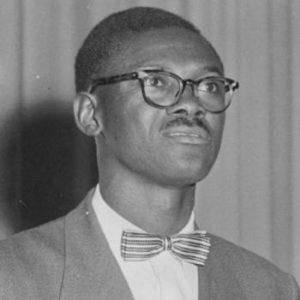
Patrice Lumumba
*On this date, in 1925, Patrice Lumumba was born. He was a Black Congolese writer, activist, and politician. Patrice Emery Lumumba was the son of a farmer, François Tolenga Otetshima, and his wife, Julienne Wamato Lomendja.
He was born in Onalua in the Katakokombe region of the Kasai province of the Belgian Congo, of the Tetela ethnic group. He had three brothers (Charles Lokolonga, Émile Kalema, and Louis Onema Pene Lumumba) and one half-brother (Tolenga Jean). Raised in a Catholic family, he was educated at a Protestant primary school, a Catholic missionary school, and finally, the government post office training school, where he passed the one-year course with distinction.
Lumumba spoke Tetela, French, Lingala, Swahili, and Tshiluba. Lumumba was interested in the Enlightenment ideals of Jean-Jacques Rousseau and Voltaire. He was also fond of Molière and Victor Hugo. He wrote poetry, and many of his works had an anti-imperialist theme.
He worked eleven years as a traveling beer salesman in Léopoldville and a postal clerk in a Stanleyville Post Office. In 1951, he married Pauline Opangu. In the period following World War II, young leaders across Africa increasingly worked for national goals and independence from the colonial powers. In 1955, Lumumba became regional head of the Cercles of Stanleyville and joined the Liberal Party of Belgium. He edited and distributed party literature. In 1958, he led the Congolese National Movement (MNC) party. He was an independent leader who served as the first Prime Minister of the independent Democratic Republic of the Congo (then the Republic of the Congo) from June until September 1960.
He played a significant role in transforming the Congo from a colony of Belgium into an independent republic. Ideologically, he was an African nationalist and Pan-Africanist. Shortly after Congolese independence in 1960, a mutiny broke out in the army, marking the beginning of the Congo Crisis. Lumumba appealed to the United States and the United Nations to help suppress the Belgian-supported Katangan secessionists led by Moise Tshombe. Both refused, so Lumumba turned to the Soviet Union for support. This led to growing differences between President Joseph Vubu and chief-of-staff Joseph Mobutu and between the United States and Belgium, who opposed the Soviet Union in the Cold War.
Lumumba was forcibly restrained on the flight to Elisabethville on January 17, 1961. State authorities imprisoned him under Mobutu. He was accompanied by Maurice Mpolo and Joseph Okito, two political associates who had planned to assist him in setting up a new government. Later that night, Lumumba was driven to an isolated spot where three firing squads had been assembled. Lumumba, Mpolo, and Okito were lined up against a tree and executed by a firing squad under the command of Katangan authorities on January 17, 1961.